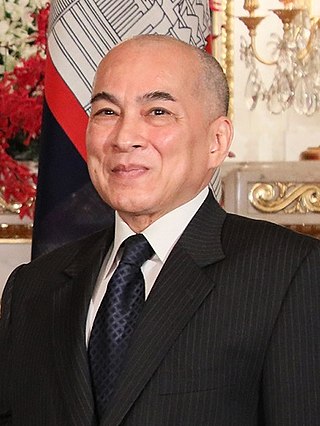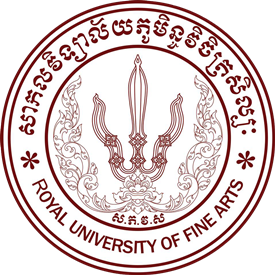Related Research Articles

Pol Pot was a Cambodian communist revolutionary, politician and a dictator who ruled Cambodia as Prime Minister of Democratic Kampuchea between 1976 and 1979. Ideologically a Maoist and a Khmer ethnonationalist, he was a leading member of Cambodia's communist movement, the Khmer Rouge, from 1963 to 1997, and served as General Secretary of the Communist Party of Kampuchea from 1963 to 1981. His administration converted Cambodia into a one-party communist state and perpetrated the Cambodian genocide which killed nearly 25% of Cambodia's population.

Phnom Penh is the capital and most populous city of Cambodia. It has been the national capital since the French protectorate of Cambodia and has grown to become the nation's primate city and its economic, industrial, and cultural centre. Before Phnom Penh became capital city, Oudong was the capital of the country.

The music of Cambodia is derived from a mesh of cultural traditions dating back to the ancient Khmer Empire, India, China and the original indigenous tribes living in the area before the arrival of Indian and Chinese travelers. With the rapid Westernization of popular music, Cambodian music has incorporated elements from music around the world through globalization.

Norodom Sihamoni is King of Cambodia. He became King on 14 October 2004, a week after the abdication of his father, Norodom Sihanouk.

Khieu Samphan is a Cambodian former communist politician and economist who was the chairman of the state presidium of Democratic Kampuchea (Cambodia) from 1976 until 1979. As such, he served as Cambodia's head of state and was one of the most powerful officials in the Khmer Rouge movement, although Pol Pot remained the General Secretary in the party.

Nuon Chea, also known as Long Bunruot or Rungloet Laodi, was a Cambodian communist politician and revolutionary who was the chief ideologist of the Khmer Rouge. He also briefly served as acting Prime Minister of Democratic Kampuchea. He was commonly known as "Brother Number Two", as he was second-in-command to Khmer Rouge leader Pol Pot, General Secretary of the Party, during the Cambodian genocide of 1975–1979. In 2014, Nuon Chea received a life sentence for crimes against humanity, alongside another top-tier Khmer Rouge leader, Khieu Samphan, and a further trial convicted him of genocide in 2018. These life sentences were merged into a single life sentence by the Trial Chamber on 16 November 2018. He died while serving his sentence in 2019.
Cambodia Town is the official name for a roughly one mile long business corridor along Anaheim Street between Atlantic and Junipero avenues in the Eastside of Long Beach, California. The area has numerous Cambodian restaurants, clothing stores, jewelry stores, and donut shops, as well as churches, temples, and service centers for Cambodian Americans. There are many other businesses in the area, such as auto repair shops, that are Cambodian-owned. Long Beach has the largest concentration of Cambodians of any city outside of Cambodia.

The Royal Ballet of Cambodia is a classical Khmer dance known for its intricate hand movements and elaborate costumes. Historically linked to the Khmer court, it has been performed at various royal ceremonies such as coronations, weddings, funerals, and Khmer holidays. The repertoire includes various ancient Khmer legends.

Battambang is the capital of Battambang Province and the third largest city in Cambodia.

The National Museum of Cambodia is Cambodia's largest museum of cultural history and is the country's leading historical and archaeological museum. It is located in Chey Chumneas, Phnom Penh.

Cinema in Cambodia began in the 1950s, and many films were being screened in theaters throughout the country by the 1960s, which are regarded as the "golden age". After a near-disappearance during the Khmer Rouge regime, competition from video and television has meant that the Cambodian film industry is a small one.

Soth Polin is a Cambodian writer. He was born in the hamlet of Chroy Thmar, Kampong Siem District, Kampong Cham Province, Cambodia. His maternal great-grandfather was the poet Nou Kan. He grew up speaking both French and Khmer. Throughout his youth, he immersed himself in the classical literature of Cambodia and, at the same time, the literature and philosophy of the West.

The Royal University of Fine Arts is a university in Chey Chumneas, Phnom Penh specialising in architecture and fine arts. It is the oldest university in Cambodia, having been in existence since 1917.

Thun Sophea is a retired professional kickboxer from Svay Rieng, Cambodia. He is the 2006 Cambodian Television Network Traditional Khmer Kickboxing champion. Thun Sophea trained at the Ministry of Defense Boxing Association under Chhit Sarim, who also trained Cambodian champion Eh Phouthong at the Ministry of Defense Boxing Club. Thun Sophea was once considered Cambodia's best kickboxer. He had defeated every notable Cambodian fighter including Sen Bunthen, Vorn Viva, Meas Chantha, Chey Kosal and Outh Phouthang.

Enemies of the People is a 2009 British-Cambodian documentary film written and directed by Rob Lemkin and Thet Sambath. The film depicts the 10-year quest of co-director Sambath to find truth and closure in the Killing Fields of Cambodia. The film features interviews of former Khmer Rouge officials from the most senior surviving leader to the men and women who slit throats during the regime of Democratic Kampuchea between 1975 and 1979.

Lakhon Khol or Khmer Masked Theatre is a dance drama genre that is performed in Cambodia.

The Communist Party of Kampuchea (CPK), also known as the Khmer Communist Party, was a communist party in Cambodia. Its leader was Pol Pot, and its members were generally known as the Khmer Rouge. Originally founded in 1951, the party was split into pro-Chinese and pro-Soviet factions as a result of the Sino–Soviet split with the former being the Pol Pot faction, and the latter adopting a more revisionist approach to Marxism. As such, it claimed that 30 September 1960 was its founding date; it was named the Workers' Party of Kampuchea before it was renamed the Communist Party in 1966.
The following lists events that happened during 2008 in Cambodia.
Ta Pech, Khleang Moeung or Sena Moeung, or Ghlāṃṅ Mīoeṅ is a mythical-historical sixteenth century military leader in, and a guardian spirit neak ta whose field of action extends to the entire west of Tonle Sap Lake.
Chheng Phon, was born in 1930 in the Kompong Cham province and died on December 22, 2016, was a Cambodian artist who served as Minister of Information and Culture in the early 1990s, who is remembered as a "prominent dramatist and professor of Cambodia" as well as a "visionary of formidable knowledge, dedication, and energy" who has devoted a lifetime to preserving and nurturing Cambodian culture.
References
- ↑ Orient-Occident: News of Unesco's Major Project on Mutual Appreciation of Eastern and Western Cultural Values. UNESCO. 1965. p. 7.
- ↑ Translations on South and East Asia. Joint Publications Research Service. 1972. p. 19.
- ↑ National Endowment for the Arts (1982). Annual Report. United States: Division of Publications. p. 75.
- ↑ Needham, Susan; Quintiliani, Karen (2008). Cambodians in Long Beach. Arcadia Publishing. p. 63. ISBN 978-0-7385-5623-9.
- ↑ Needham, Susan; Quintiliani, Karen (2008). Cambodians in Long Beach. Arcadia Publishing. p. 64. ISBN 978-0-7385-5623-9.
- ↑ Khing, Hoc Dy. "Biography of Nuon Kan" (PDF). Khmer Theravada Buddhism (in Khmer). Archived (PDF) from the original on 2022-02-13. Retrieved 2022-02-12.
- ↑ Samath, Kim; Chann, Tet (2010-07-08). "Loving our country". Phnom Penh Post. Retrieved 2022-02-12.